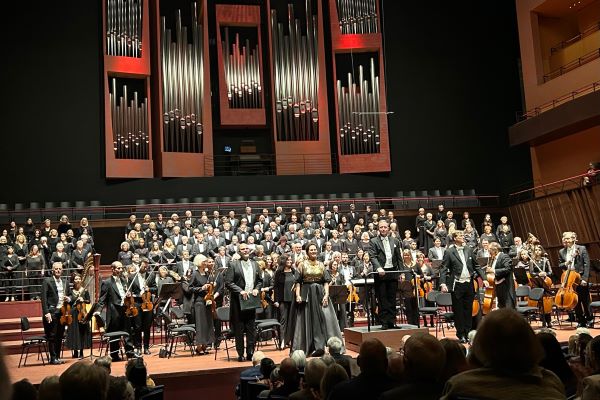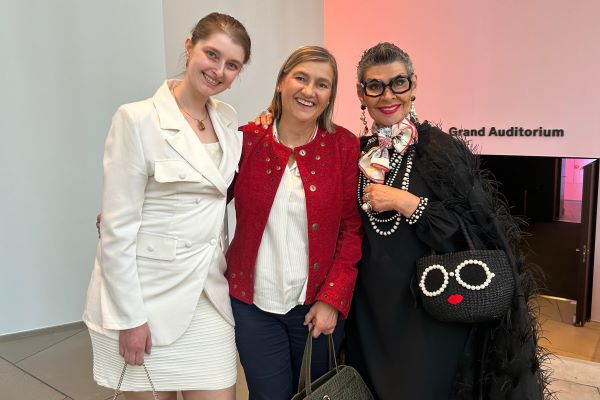 "60 Joer Madrigal de Luxembourg" charity concert at the Philharmonie Luxembourg;
Credit: Elza Osmane, Chronicle.lu
"60 Joer Madrigal de Luxembourg" charity concert at the Philharmonie Luxembourg;
Credit: Elza Osmane, Chronicle.lu
On Sunday 12 October 2025, the Philharmonie Luxembourg hosted the 60 Years of Madrigal de Luxembourg - Charity Concert, organised in collaboration with the Richard Wagner Verband Trier-Luxemburg in support of Nestwärme Luxembourg, an organisation helping families with seriously ill children.
Before the performers took to the stage, the Grand Auditorium was already set for splendour. The hall’s stage was filled with chairs, stands and instruments, prepared for the large ensemble that would soon gather.
The concert opened with applause as conductor Jochen Schaaf and the orchestra took the stage to perform Richard Wagner's Siegfried-Idyll. Its gentle beginning gradually expanded into a fuller sound, setting a tone of anticipation that carried through the programme.
Later, the string musicians were joined by the Neues Rheinisches Kammerorchester (New Rhenish Chamber Orchestra from Cologne, Germany), Luxembourg vocal ensembles Le Madrigal de Luxembourg and Eurocantica, two percussionists and soloists Antje Bitterlich (soprano), Andreas Post (tenor) and David John Pike (baritone).
The first joint performance, Claude Debussy’s L'Enfant prodigue (The Prodigal Son), featured a series of vocal and instrumental sections that gradually brought the full ensemble together. During this piece, the choir, positioned on the upper steps at the back, did not yet participate.
The singers stood at the front centre of the stage, behind them the string orchestra, followed by the wind section, while the choir was seated further back on the raised tribune.
Speaking to Chronicle.lu after the first part of the concert, Nestwärme co-founder and chairperson Elisabeth Schuh, Luxembourgish influencer Nadine Robert and author Laura Christen noted that it was their first time attending a Madrigal concert and all agreed that it had resonated with them.
Nadine Robert shared: “I was invited by a friend and had no expectations but the concert truly moved me […] I was crying. It was beautiful.”
In the second part of the concert, the pipe organist, Trierer Konzertchor, joined the ensemble for Johannes Brahms’ Ein deutsches Requiem, Op. 45, performed under the direction of conductor Schaaf and choir director Daniel Lang.
The Philharmonie’s grand pipe organ towers above the stage and is integrated into the architecture of the Grand Auditorium, serving its function as a key musical instrument, while also acting as an architectural feature of the hall.
The programme reached a powerful conclusion with the choir performing Selig sind die Toten (Blessed are the dead), the final movement of Brahms’ Ein deutsches Requiem (A German Requiem).
In the lead-up to the event, Chronicle.lu spoke with conductor Jochen Schaaf and singer Susanne Braun about the inspiration behind the programme, future aspirations and potential evolutions in Le Madrigal de Luxembourg’s musical repertoire.
Chronicle.lu: For the 60-year anniversary concert, what was the inspiration behind the selection of works by Wagner, Debussy and Brahms?
Jochen Schaaf: The concert is organised by the Richard Wagner Verband Trier-Luxemburg, hence the "hommage" (tribute) to Wagner with the Siegfried Idyll. Debussy's work, like Brahms' Ein Deutsches Requiem, features a soprano and a baritone soloist - a natural pairing. Moreover, L'Enfant prodigue, composed in the second half of the 19th century, like Brahms’ Requiem, makes for a particularly engaging contrast and comparison. The choir also joins in at the end of Debussy's piece.
Chronicle.lu: In terms of profile and style, after 60 years, how does the current ensemble differ from previous iterations?
Susanne Braun: The Madrigal started out as a very small ensemble, with a focus on performing madrigals either a cappella or with only minimal instrumental accompaniment. Over the years, things have evolved - while classical music still forms the heart of our repertoire, we now also perform larger works with orchestral accompaniment. Before the pandemic, the Madrigal had up to 40 members; at the moment, we're around 20 singers and always looking for new voices to join us. We also offer the possibility for singers to take part in individual projects rather than committing long-term, which makes it more flexible. For this concert, it's wonderful to join forces with other great choirs and create such an impressive presence of 120 singers on stage.
Chronicle.lu: Over the years, Madrigal has continued to embrace tradition whilst tackling more modern material. Looking to the future, how do you see Madrigal developing for newer audiences and new members?
Susanne Braun: That's a tough question, because our "traditional" audience is naturally getting older, and interest in classical music seems to be declining among younger generations. That said, young composers and musicians in the field of "new classical" music might be helping to spark a change. Also, big works with well-known names are always crowd-pullers - they might even encourage friends or family members to get more curious about the genre or the choir itself. As Madrigal, we'll continue to focus on high vocal quality and on collaborating with other Luxembourgish choirs, so that this part of Luxembourg's choral and cultural heritage continues to thrive.
The charity concert was part of Le Madrigal de Luxembourg’s collaboration with Nestwärme, whose cross-border hospice project in Trier (Germany) will also support families from Luxembourg when it opens next autumn.
EO

(Pictured (L-R): Author Laura Christen; Nestwärme co-founder and chairperson Elisabeth Schuh; Luxembourgish influencer Nadine Robert; Credit: Elza Osmane, Chronicle.lu)








